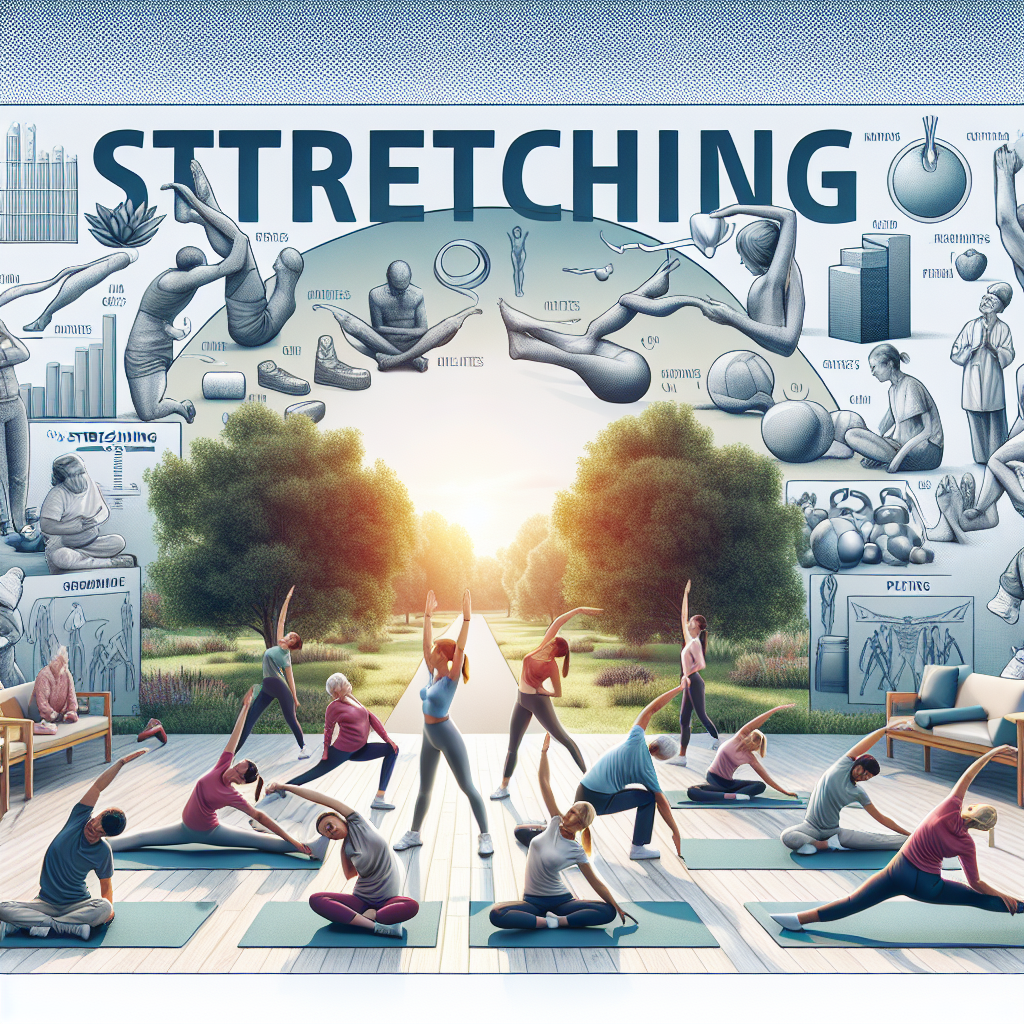Why Stretching Is Essential for Your Health

Discover why stretching is essential for your health! It improves flexibility, increases blood flow, and enhances your overall well-being. Don’t wait, learn more about the benefits of stretching and how to incorporate it into your daily routine. Visit My Vibrant Vitality now!
The Vital Role of Stretching in Maintaining Optimal Health
Stretching is often overlooked in our daily routines, yet it plays a vital role in maintaining optimal health. It is an essential component of fitness that can improve your physical performance, decrease your risk of injuries, and ensure your body’s flexibility. This article aims to shed light on the importance of stretching and why it should be an integral part of your daily routine.
To begin with, stretching enhances your body’s flexibility. This is crucial because flexibility aids in the performance of daily activities and physical exercises. It allows your joints to move through their full range of motion, which can help in maintaining a good posture and reducing the risk of injuries. When your muscles are more flexible, they can handle more physical stress and are less likely to be strained or pulled.
Moreover, stretching can also improve your physical performance. By increasing your flexibility, you can move more efficiently. This can be particularly beneficial for athletes, as it can enhance their performance in sports that require flexibility, such as gymnastics, martial arts, and ballet. However, even if you’re not an athlete, stretching can still help you perform better in your daily activities. For instance, it can make it easier for you to reach high shelves, bend down to pick up things, or carry heavy items.
In addition to improving flexibility and physical performance, stretching can also help prevent injuries. When you stretch regularly, you’re less likely to experience muscle imbalances, which are a common cause of injuries. Stretching can also help reduce the risk of developing chronic conditions such as arthritis and back pain. It does this by improving blood circulation, which helps to supply nutrients to your muscles and remove waste products. This can help keep your muscles healthy and prevent them from becoming tight and prone to injury.
Furthermore, stretching can also contribute to your mental well-being. It can help reduce stress and promote relaxation. When you stretch, you’re essentially giving yourself a mini-massage. This can help to relieve tension in your muscles, which can in turn help to reduce stress levels. Moreover, stretching can also help to improve your mood. It does this by releasing endorphins, which are chemicals in your brain that act as natural mood lifters.
Lastly, stretching can also help improve your posture. When your muscles are tight and tense, they can pull your body out of alignment, leading to poor posture. However, by stretching regularly, you can help to keep your muscles loose and flexible, which can help to improve your posture.
In conclusion, stretching is an essential part of maintaining optimal health. It can improve your flexibility, enhance your physical performance, prevent injuries, reduce stress, and improve your posture. Therefore, it’s important to make stretching a regular part of your daily routine. Whether you’re an athlete or just someone who wants to stay healthy, stretching can provide numerous benefits for your physical and mental well-being. So, the next time you’re planning your workout routine, don’t forget to include some time for stretching. Your body will thank you for it.
Understanding the Health Benefits of Regular Stretching

Stretching is an integral part of any fitness regimen, yet it is often overlooked or undervalued. Many people tend to focus on cardiovascular exercises or strength training, neglecting the importance of flexibility and the role it plays in overall health. However, incorporating regular stretching into your routine can provide numerous health benefits, from improved posture to enhanced physical performance.
Firstly, stretching can significantly improve your flexibility. This is crucial because flexibility aids in maintaining a range of motion in the joints. Without it, the muscles shorten and become tight, which then puts you at risk for joint pain, strains, and muscle damage. Regular stretching keeps muscles long, lean, and flexible, and this means that exertion won’t put too much force on the muscle itself. Healthy muscles also help a person with balance problems to avoid falls.
Another significant benefit of regular stretching is improved posture. Tight muscles can cause poor posture. For instance, sitting at a desk all day can result in tight chest muscles and an overstretched back, leading to a hunched posture. Regular stretching can help to rectify this by lengthening tight muscles and strengthening the muscles that support the spine. Over time, this can result in a significant improvement in posture.
Moreover, stretching can also enhance physical performance. By increasing flexibility and range of motion, stretching allows your body to move more efficiently. This can translate into better athletic performance, whether you’re running a marathon, swimming laps in a pool, or simply going for a brisk walk. Regular stretching can also help to increase your endurance, as it improves circulation, allowing your muscles to receive a greater supply of oxygen and delaying the onset of muscle fatigue.
Furthermore, stretching can also be a powerful stress reliever. When you’re experiencing stress, there’s a good chance your muscles are tense. That’s because your muscles tend to tighten up in response to physical and emotional stress. Stretching can help to relax tense muscles and provide a sense of overall relaxation. It’s also a great way to take a break from your daily routine and spend some time focusing on your body and mind.
Lastly, stretching can contribute to reducing pain and stiffness. Numerous studies have shown that regular stretching can help to reduce muscle soreness after exercise. It can also help to reduce the symptoms of conditions such as arthritis and fibromyalgia. This is because stretching increases blood flow to the muscles, which can help to speed up recovery and reduce muscle pain.
In conclusion, regular stretching is essential for maintaining overall health and well-being. It can improve flexibility, enhance physical performance, reduce stress, and alleviate pain and stiffness. However, it’s important to remember that stretching should be done correctly to avoid injury. Always warm up your body before stretching, and aim to stretch both sides of your body equally. Avoid bouncing while stretching, as this can cause injury. Instead, hold each stretch for about 30 seconds, and remember to breathe. With regular practice, you’ll start to see the many benefits that stretching can offer.
Why Stretching is a Crucial Component of a Healthy Lifestyle
Stretching is often overlooked in the pursuit of a healthy lifestyle. Many people focus on diet and exercise, neglecting the crucial role that flexibility plays in overall health. However, incorporating regular stretching into your routine can have profound benefits for your body and mind.
To begin with, stretching enhances your physical health in several ways. It increases flexibility, which is essential for your overall fitness. A flexible body is more efficient, moves more fluidly, and is less prone to injury. Stretching also improves your posture by strengthening the muscles that support your spine, reducing the risk of back pain and other musculoskeletal disorders.
Moreover, stretching can enhance your athletic performance. By increasing your range of motion, stretching allows you to perform movements more comfortably and efficiently. This can lead to improvements in various physical activities, from running and cycling to dancing and yoga. In addition, stretching can aid in muscle recovery after exercise. It helps to increase blood flow to your muscles, which can speed up recovery time and reduce muscle soreness.
Beyond the physical benefits, stretching also has a positive impact on your mental health. It is a form of mindful movement, allowing you to connect with your body and focus on the present moment. This can help to reduce stress and anxiety, promoting a sense of calm and wellbeing. Furthermore, stretching can improve your sleep quality. By helping to relax your muscles and quiet your mind, it can make it easier for you to fall asleep and stay asleep.
Despite these benefits, many people neglect stretching because they don’t know how to do it properly or they believe it’s not as important as other forms of exercise. However, stretching is a simple activity that can be done anywhere, at any time, and it doesn’t require any special equipment. You can stretch while watching TV, during a break at work, or as part of your morning routine. The key is to make it a regular part of your lifestyle, just like eating healthy and staying active.
When it comes to stretching, it’s important to listen to your body and not push yourself too hard. Stretching should never cause pain. Instead, it should feel like a gentle pull on your muscles. If you’re new to stretching, it’s a good idea to start with basic stretches and gradually increase the intensity as your flexibility improves. You can also seek guidance from a fitness professional or physical therapist to ensure that you’re stretching safely and effectively.
In conclusion, stretching is a crucial component of a healthy lifestyle. It offers a multitude of physical and mental health benefits, from increased flexibility and improved athletic performance to reduced stress and better sleep. By incorporating regular stretching into your routine, you can enhance your overall health and wellbeing. So, the next time you’re planning your health regimen, don’t forget to include stretching. It’s a simple, yet powerful way to boost your health and enhance your quality of life.